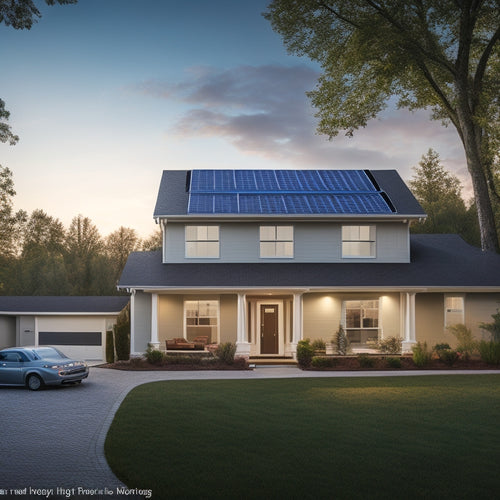
Residential Energy Storage System
Share
Your residential energy storage system provides a reliable backup power source during outages, ensuring essential appliances like refrigeration and lighting remain functional, and offering peace of mind and energy independence. By supplying power when the grid fails, you'll reduce your reliance on noisy, polluting generators and protect your home from financial losses linked to outages. Smart technology monitors your energy usage and storage levels, automatically switching to backup mode during outages. Now that you've taken the first step in understanding residential energy storage, you'll want to investigate how to optimize your system's efficiency, lifespan, and performance.
The Essentials
- Residential energy storage systems provide backup power during outages, ensuring essential appliances remain functional and offering peace of mind and energy independence.
- Smart technology monitors energy usage and storage levels, automatically switching to backup mode during outages to ensure power continuity and reliability.
- Energy storage systems optimize energy consumption and reduce waste by identifying inefficiencies in real-time and capturing lost energy during transmission.
- Understanding energy usage patterns is crucial for system selection, necessitating the calculation of daily power requirements for efficiency and optimal storage sizing.
- Battery health monitoring is essential for performance tracking and extending battery life, with regular observations preventing major issues and costly repairs.
Backup Power During Outages
You expect your residential energy storage system to provide power when you need it most - during outages.
With a reliable energy supply, you can rest assured that your essential appliances will continue to function seamlessly, even when the grid fails. A reliable battery backup for home provides a detailed solution to three common problems that often arise during these events, ensuring that vital home systems, such as refrigeration and lighting, continue to function smoothly, preventing food spoilage and maintaining safety.
This is especially important for households with essential medical equipment or those who rely on refrigeration for medication.
Power When You Need
During extended power outages, many homeowners are left without access to essential appliances and lighting, leading to inconvenience, discomfort, and even safety risks. With a residential energy storage system, you can have power when you need it most. This means you'll have energy independence and can keep your lights on, fridge running, and medical equipment powered during outages.
| System Component | Function | Benefit |
|---|---|---|
| Inverter/Converter | Converts DC power to AC power for your home | Provides reliable power during outages |
| Energy Storage | Stores excess energy generated by your solar panels or grid | Offers energy independence and cost savings |
| Smart Controller | Monitors and controls energy flow | Optimizes energy usage and reduces waste |
With a residential energy storage system, you'll have the freedom to power your home on your own terms. You'll enjoy cost savings by reducing your reliance on the grid and having energy independence during outages. By having power when you need it, you'll stay safe, comfortable, and connected.
Reliable Energy Supply
Having a reliable energy supply is vital in the current era, especially when the grid fails. You rely on electricity to power your home, and outages can disrupt your daily life. A residential energy storage system provides backup power during outages, ensuring you remain connected and comfortable.
With the ability to reduce your reliance on noisy, polluting generators, you can enjoy a quieter and more eco-friendly alternative. This innovative solution also protects your home and its contents from the financial losses and safety risks associated with prolonged power outages.
With a reliable energy supply, you're no longer at the mercy of the grid. You can enjoy energy independence, relying on your stored energy when the grid fails. This is particularly significant for households with critical medical equipment or those who work from home.
Smart technology integrated into the system monitors your energy usage and storage levels, optimizing energy distribution and ensuring a seamless changeover to backup power during outages.
During an outage, the system automatically switches to backup mode, providing power to your essential appliances. You'll have peace of mind knowing your home remains powered, even when the grid is down.
With a reliable energy supply, you're in control, enjoying the freedom and security that comes with energy independence.
Reduced Energy Waste
When you install a residential energy storage system, you're able to optimize your energy consumption by storing excess energy generated during the day for use at night. This approach prevents energy loss, reducing the amount of wasted energy that's typically lost during transmission and distribution.
By leveraging off-grid solar battery technology, you can further reduce your reliance on the grid and enjoy a more consistent supply of power. Additionally, with a deep cycle solar battery, you can store excess energy for extended periods of time, making the most of your solar energy investment.
Optimized Energy Consumption
By integrating a residential energy storage system, you can greatly reduce energy waste and optimize your energy consumption.
With smart technology, you can monitor and control your energy usage in real-time, identifying areas of inefficiency and making adjustments to maximize energy efficiency. This means you can prioritize energy-intensive tasks during off-peak hours, reducing strain on the grid and minimizing waste.
Additionally, the system's advanced algorithms can analyze your energy usage patterns and optimize your consumption accordingly, ensuring that you're using the cleanest and most efficient energy possible.
Energy Loss Prevention
Your residential energy storage system is designed to minimize energy losses throughout your home. This means that it's designed to prevent energy waste and guarantee that you get the most out of your energy consumption.
One way it does this is through energy recovery. This process involves capturing and storing energy that would otherwise be lost during transmission or conversion. By recovering this energy, you can reduce your energy bills and minimize your carbon footprint.
Another key feature of your residential energy storage system is demand response. This feature allows your system to adjust its energy output based on your energy needs in real-time. By doing so, it can prevent energy waste by only providing the amount of energy needed to power your home.
This not only saves you money but also helps to reduce strain on the grid during peak hours. By combining energy recovery and demand response, your residential energy storage system can help you achieve maximum energy efficiency and reduce energy waste.
This means you'll have more control over your energy consumption and can enjoy the freedom to live life on your own terms.
Deep Cycle Battery Life
When you're considering a deep cycle battery for your residential energy storage system, you'll want to understand the factors that affect its lifespan.
Renewable energy systems, such as off-grid power solutions, require reliable deep cycle batteries to guarantee a consistent electricity supply.
You'll find that the depth of discharge (DOD) and the number of charge cycles are essential in determining how long your battery will last.
Battery Lifespan Factors
Deep cycle batteries, the backbone of residential energy storage systems, are only as dependable as their lifespan. As you reflect on integrating these systems into your home, it's vital to understand the factors that affect battery lifespan.
You should be aware that battery chemistry plays a significant role in determining lifespan. Different chemistries, such as lead-acid, lithium-ion, and nickel-cadmium, have varying lifespans and performance characteristics.
Temperature effects also come into play, as extreme temperatures can reduce battery lifespan. Your charging habits, including the frequency and rate of charge, can impact battery health.
Proper maintenance practices, such as monitoring state of charge and performing regular checks, are critical in extending battery life. Discharge rates, or how deeply you drain the battery, can affect lifespan.
Environmental conditions, like humidity and temperature, also influence battery performance. Your usage frequency, or how often you use the battery, and age impact, or how well the battery holds up over time, are additional factors to reflect on.
Cycle Depth Importance
Most residential energy storage systems rely on deep cycle batteries that can handle a significant number of charge and discharge cycles. As you consider your energy storage system, it's vital to understand the importance of cycle depth in relation to your battery's lifespan. Cycle depth refers to the percentage of the battery's capacity that's used during each cycle.
| Cycle Depth | Cycle Life |
|---|---|
| 20% | 5,000 - 7,000 cycles |
| 50% | 2,000 - 3,000 cycles |
| 80% | 1,000 - 2,000 cycles |
| 90% | 500 - 1,000 cycles |
| 100% | 200 - 500 cycles |
As you can see, shallower cycle depths result in longer cycle lives. This is because deeper cycle depths cause more stress on the battery, reducing its overall lifespan. To maximize your battery's lifespan, it's important to focus on cycle efficiency and capacity management. By doing so, you can guarantee your energy storage system operates at peak levels, providing you with the freedom and independence you desire.
Assess Your Energy Demands
You need to understand your energy usage patterns to determine the right residential energy storage system for your home, considering factors such as solar battery storage and backup energy needs.
This is essential as it impacts the overall efficiency of your system. This involves calculating your daily power requirements, including the total watt-hours you use during peak hours.
Energy Usage Patterns
Understanding your energy usage patterns is essential to determining the ideal residential energy storage system for your needs. You must assess your consumption habits to identify areas where energy efficiency can be improved. This involves analyzing your daily routines, appliance usage, and overall energy consumption.
Start by monitoring your energy usage over a period of time to identify patterns and peak usage hours. This will help you understand which appliances or devices are consuming the most energy.
You may find that certain appliances, like refrigerators or air conditioners, are using more energy than necessary. By identifying these areas of inefficiency, you can implement changes to reduce your energy consumption.
Daily Power Requirements
Evaluating your daily power requirements involves calculating the total amount of energy your home needs to function at its finest.
You'll need to evaluate your energy demands to determine the ideal energy storage system for your residence. Start by identifying the appliances and devices that consume the most energy, such as refrigerators, air conditioners, and electric vehicles. Consider their wattage ratings and the number of hours they operate daily. This will give you a thorough understanding of your energy usage patterns.
Next, focus on energy efficiency and usage optimization. Look for opportunities to reduce energy consumption by upgrading to energy-efficient appliances, installing LED lighting, and optimizing your heating and cooling systems.
You can also consider time-of-use pricing and load shifting to minimize peak demand. By accurately evaluating your daily power requirements, you'll be able to size your energy storage system correctly, ensuring you have a reliable and efficient source of power when you need it most.
This will give you the freedom to enjoy your home while minimizing your reliance on the grid.
Longer Cycle Life Guarantee
You'll want to confirm your residential energy storage system's battery lasts as long as possible, and that's where a longer cycle life guarantee comes in.
A key aspect of this guarantee is battery health monitoring, which involves tracking the battery's state of charge, state of health, and other essential signs.
Battery Health Monitoring
By the time your residential energy storage system has been in operation for a few years, its battery health becomes a critical factor in determining the overall performance and longevity of the system.
To guarantee ideal performance, you'll want to implement a battery health monitoring system that provides real-time observations into your battery's condition. This system should include advanced battery diagnostics, allowing you to track key performance metrics such as charge cycles, efficiency ratings, and usage trends.
Regular monitoring enables you to identify potential issues before they become major problems, reducing the need for costly repairs and downtime.
A detailed monitoring system will also provide real-time alerts when maintenance practices are required, guaranteeing you stay on top of degradation analysis and health indicators.
By staying informed, you can take proactive measures to extend the life of your battery, maximizing your investment in your residential energy storage system.
With accurate data at your fingertips, you'll be equipped to make informed decisions about your energy storage system, guaranteeing you achieve the freedom and independence you desire.
Frequently Asked Questions
Can Residential Energy Storage Systems Be Installed Outdoors?
You can install energy storage systems outdoors, but you'll need weatherproofing options to protect them from harsh weather conditions; outdoor installation requires careful planning and selection of suitable enclosures to guarantee reliability and performance.
Are Energy Storage Systems Compatible With Existing Solar Panels?
Imagine utilizing the sun's power with ease! You'll be relieved to know that most energy storage systems seamlessly integrate with your existing solar panels, regardless of battery types, and won't break the bank with exorbitant installation costs.
How Much Space Is Required for a Residential Energy Storage System?
When planning your installation, you'll need to evaluate the space requirements, focusing on optimization to minimize footprint. Typically, a compact design with a small footprint is ideal, freeing up precious space for your home or yard.
Can I Monitor My Energy Storage System Remotely?
Imagine having eyes on your energy usage from anywhere; you can, with remote monitoring capabilities that put energy management at your fingertips, giving you the freedom to optimize and control your energy storage system from afar.
Are Residential Energy Storage Systems Eligible for Government Incentives?
You're likely eligible for government incentives, such as incentive programs and tax credits, which can greatly reduce your system's cost, giving you more freedom to invest in your energy independence.
Final Thoughts
As you consider a residential energy storage system, remember that it's not just about convenience - it's about taking control of your energy future. Did you know that the average American household loses $300 annually due to power outages? By investing in a reliable backup power system, you can mitigate these losses and guarantee a steady supply of energy when you need it most. With a deep cycle battery life guarantee, you can have peace of mind knowing your system will perform when it counts.
Related Posts
-

Solar Phone Chargers for Camping Essentials
Solar phone chargers are must-haves for your camping essentials, allowing you to stay connected while enjoying nature...
-

Cost of Solar With Battery Backup
You're investing in a solar panel system with battery backup to guarantee reliable power during outages. The cost of ...
-

Essential Hiking Lights for Safety and Fun
When you're hitting the trails, essential hiking lights are vital for safety and fun. A lightweight headlamp offers h...


